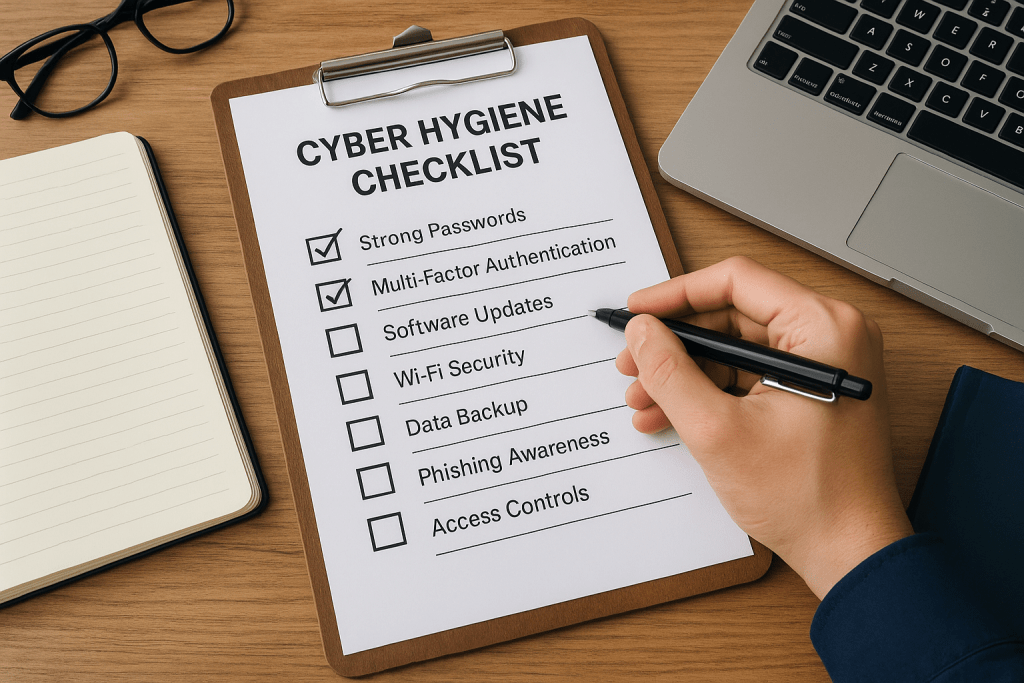
Good cybersecurity doesn’t always start with advanced tools — it starts with habits. Just like washing your hands prevents illness, good “cyber hygiene” practices protect your business from the most common threats. For small businesses in Arizona, these simple steps can drastically reduce the risk of ransomware, phishing attacks, and costly downtime.
1. Use Strong, Unique Passwords
Avoid reusing passwords across accounts. Every system, app, and login should have its own unique password. Use a password manager to simplify this process and generate secure combinations.
2. Turn on Multi-Factor Authentication (MFA)
MFA adds a second step (like a code on your phone) to the login process. Even if a password is stolen, MFA makes it much harder for attackers to get in.
3. Keep Software Updated
Outdated operating systems, apps, and firmware are a hacker’s best friend. Enable automatic updates where possible so vulnerabilities are patched quickly.
4. Secure Your Wi-Fi Network
Make sure your business Wi-Fi uses strong encryption (WPA3 if available), has a unique password, and separates guest access from your main network.
5. Back Up Data Regularly
Automated, encrypted backups are essential. Test your recovery process — a backup you can’t restore is worthless. Cloud and on-premises hybrid solutions work best for small businesses.
6. Train Employees to Spot Phishing
Human error is the #1 way cybercriminals gain access. Teach employees how to recognize suspicious emails, fake links, and unexpected attachments. A quick check before clicking can prevent a disaster.
7. Limit Access to Sensitive Information
Not every employee needs access to every file. Use role-based permissions so staff can only access what they need to do their jobs.
8. Use Antivirus and Endpoint Protection
Modern antivirus tools (ideally with Endpoint Detection & Response, or EDR) provide real-time protection against malware, ransomware, and intrusions.
9. Encrypt Devices
Laptops, mobile devices, and even desktops should use full-disk encryption. If a device is lost or stolen, encryption prevents your data from falling into the wrong hands.
10. Have an Incident Response Plan
Know what steps to take if a cyber incident occurs: who to contact, how to contain the issue, and how to recover quickly. Even a simple written plan saves critical time during a crisis.
Why Cyber Hygiene Matters for Arizona Businesses
Cyber hygiene isn’t just IT jargon, it’s the frontline defense that protects your clients, your contracts, and your reputation. Many Arizona small businesses work in compliance-heavy industries like healthcare, finance, and defense contracting, where regulators require proof of these safeguards. By following a cyber hygiene checklist, you not only protect yourself from cyberattacks but also demonstrate compliance readiness for frameworks like HIPAA, FTC Safeguards, and CMMC.
How Asteroid IT Can Help
At Asteroid IT, we combine proactive cybersecurity services with 10-minute average response times and a patent-pending Virtual Technician that keeps your systems secure even during internet outages. We specialize in helping small businesses — from CPA firms to healthcare providers to DoD contractors, stay protected without corporate-style lock-in contracts.
Take the Next Step
Don’t wait for a breach to expose your weaknesses. Schedule your free IT assessment today and get a clear picture of where your business stands.
Get My Free IT Assessment →
